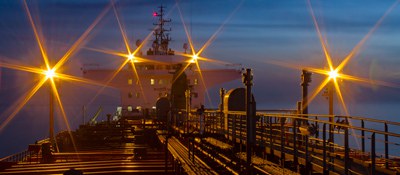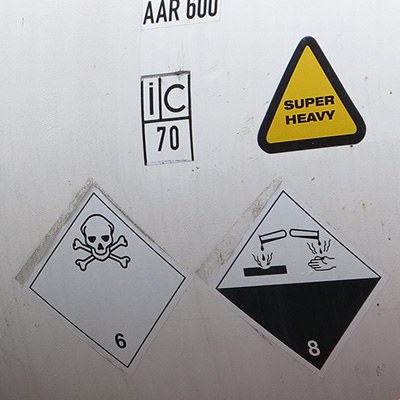BG Verkehr / Dienststelle Schiffssicherheit
Referat Maschine
Brandstwiete 1
20457 Hamburg

Holger Steinbock
Phone: +49 40 36137-217
Fax: +49 40 36137-204
Mail: maschine@bg-verkehr.de

Jörg Heuckeroth
Phone: +49 40 361 37-231
Fax: +49 40 361 37-204
Mobile: +49 171 50 57 038
Mail: maschine@bg-verkehr.de
Bundesamt für Seeschifffahrt und Hydrographie
Referat S 15
Bernhard-Nocht-Straße 78
20359 Hamburg

Katrin Ewert
Phone: +49 40 31 90 74 10
Fax: +49 40 31 90 5000
Mail: marpol@bsh.de
Protection from oil, chemicals, harmful substances (MARPOL Annex I-III)
- Protection from oil pollution (MARPOL Annex I)
- Double hull tankers enhance maritime safety
- Transport of chemicals (MARPOL Annex II)
- Carriage of harmful substances in packaged form (MARPOL Annex III)
- Reporting inadequate reception facilities
Protection from oil pollution (MARPOL Annex I)
Due to their cargo, tankers pose a particular risk to the environment. The International Maritime Organization IMO has the declared aim to render the transport of oil and oil products by tankers safe and environmentally friendly. The Marine Environmental Protection Committee (MEPC) of the IMO has established internationally mandatory regulations for oil tankers by adoption of Annex I of the International Convention for the Protection of Marine Pollution from Ships (MARPOL).
Annex I of the MARPOL Convention is mainly focused on rules for the design and construction of oil tankers and their equipment. These requirements are closely related to the damage stability requirements for oil tankers. In view of the consequences of an oil spill, it is paramount to avoid the sinking of a tanker after an accident.
The Ship Safety Division of the BG Verkehr enforces the MARPOL requirements on German-flagged ships. Its surveyors and the surveyors of classification societies inspect the ship structure, equipment and documentation on the ship in accordance with Annex I of the Convention. If all provisions are met, the Ship Safety Division issues the "International Oil Pollution Prevention Certificate" (IOPP).
The Federal Maritime and Hydrographic Agency (BSH) inflicts penalties for infringements of MARPOL Annex I in German maritime waters as administrative offences in accordance with the Federal "See-Umweltverhaltensverordnung" (ordinance on maritime environmental conduct) provided they do not come under criminal law.
Information on the restrictions regarding discharge of oil and oily mixtures from cargo tanks are given on the website of the Federal Maritime and Hydrographic Agency.

Double hull tankers enhance maritime safety
Double hull tankers are ships with an outer and an inner shell. If the outer shell is penetrated in a collision or grounding, the inner shell still prevents any outflow of oil. Therefore, the double hull design is a decisive improvement in the safety of oil tankers.
All new tankers built since 1996 must be of double hull construction. Previously, there were transitional regulations in place for ships built in or before 1996. Meanwhile however, single hull tankers may not travel internationally or call on US or EU ports.
Double hull construction does not only protect the marine environment, but also avoids pollution by cargo residues in routine ship operations. In an optimized tank layout, ballast water tanks are arranged to protect cargo tanks in case of collisions.
Transport of chemicals (MARPOL Annex II)
Transport of chemicals and liquid raw materials for the food and animal food industries pose a major threat to the marine environment. Annex II of the MARPOL Convention contains provisions for the construction, equipment and operation of chemical tankers. This contributes towards the environmentally sound transportation of noxious liquid substances in bulk.
Basic principles of MARPOL annex II are:
- Safe containment of the noxious liquid substances,
- dilution of discharges and
- limitation of discharges into the sea.
All important operations in connection with noxious liquid substances must be recorded in a cargo record book.
The Federal Maritime and Hydrographic Agency (BSH) inflicts penalties for infringements of MARPOL Annex II in German maritime waters as administrative offences in accordance with the Federal "See-Umweltverhaltensverordnung" (ordinance on maritime environmental conduct) provided they do not come under criminal law.
The website of the Federal Maritime and Hydrographic Agency (BSH) offers precise information about the conditions under which discharges of residues with noxious liquid substances are admissible.
Annex II of the MARPOL convention is supplemented by the "International Code for the Construction and Equipment of Ships carrying Dangerous Chemicals in Bulk" (IBC code). The IBC code contains detailed provisions for the design and construction, as well as the equipment of chemical tankers. You can find further information on the IBC Code under the heading "Safety · Security".

Carriage of harmful substances in packaged form (MAPROL Annex III)
"Regulation for the prevention of pollution by harmful substances carried by sea in packaged form" – is the rather unwieldy title of MARPOL Annex III. This Annex regulates the carriage of harmful substances in packaged form.
MARPOL Annex III should always be read in conjunction with the IMDG Code (International Maritime Dangerous Goods Code). The IMDG Code separates goods into different categories which determines how the cargo needs to be handled. If a harmful substance is categorized as marine pollutant in the IMDG Code, it is also a harmful substance under MARPOL Annex III. Marine pollutants are dangerous goods with properties adverse to the marine environment, for example:
- hazardous to aquatic life (marine fauna and flora),
- impairing the taste of seafood, or
- accumulating pollutants in aquatic organisms.
Marine pollutants must be specially packaged, labelled and stowed on board to prevent their release into the marine environment. By means of the special labeling such pollutants may also be identified and separated from other cargoes during salvage operations after an accident.
You can find further information on dangerous goods under the heading "Safety · Security".
Reporting inadequate reception facilities
Waste generated on board ships - including inter alia sludge, sewage, general garbage - are either disposed of on board e.g. by incineration or discharged to a reception facility at a port. If German-flagged ships encounter difficulties to discharge ship-generated waste under MARPOL Annexes I-VI to port reception facilities, this format should be filled in and supplemented with appropriate details and information and sent to marpol@bsh.de for review and follow-up.
Information on the requirements for the delivery of waste from ships introduced with the PRF Directive (EU) 2019/883 can be found on pur web page "Ship's sewage and garbage (MARPOL Annex IV and V)".

